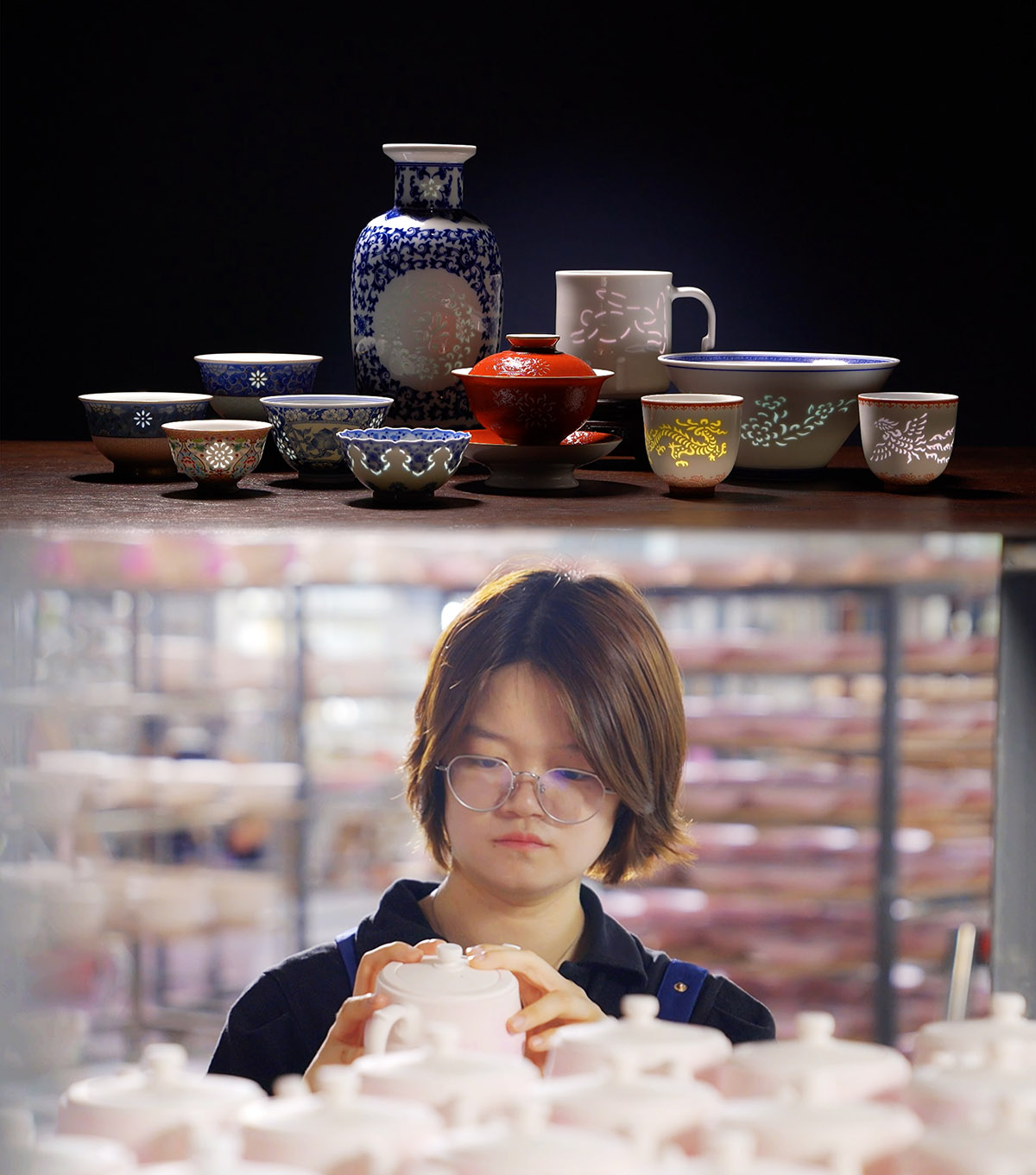
There is a unique type of porcelain that appears to be covered with small "holes" yet can still hold water without leaking. Known as "Linglong porcelain", it is one of the four esteemed traditional porcelains from Jingdezhen, often referred to as the "city of porcelain" in East China's Jiangxi province.
Unlike ordinary ceramics, Linglong porcelain is meticulously crafted by first carving tiny holes into the porcelain body, which are then filled with a unique glaze. After undergoing high-temperature firing, the outcome is a piece adorned with small, translucent "windows "embedded within it, earning it the nickname "porcelain inlaid with glass".
Due to the complexity of its production process, only a limited number of Linglong porcelain pieces have survived over time. Today, carrying forward this elaborate glazing technique is Lyu Yating, an artisan born in 1993.
Lyu comes from a family in Jingdezhen deeply rooted in the porcelain industry, a heritage dating back to her great-grandfather. In 1993, her father established the Linglong porcelain brand, Fuyu Porcelain.
"I spent my childhood in the ceramic workshop, playing with clay every day," Lyu recalled.
READ MORE: Firing up traditional expertise
While studying international business in the UK, Lyu noticed that many foreign museums exhibited Chinese porcelain. "Seeing those ceramics made me really want to preserve this tradition. It's a crucial part of Chinese culture, reflecting generations of craftsmanship," she said.
Upon graduating in 2014 at the age of 21, Lyu made the unconventional choice to give up further academic pursuits and lucrative offers from multinational corporations. Instead, she returned to her roots, taking on the responsibility of mastering the art of Linglong porcelain from her father.
Rather than immediately taking on a managerial role, Lyu's father emphasized the importance of her learning the craft of porcelain making. For more than a decade, Lyu diligently apprenticed under the factory's artisans, immersing herself in the intricacies of ceramic techniques.
This hands-on experience allowed her to develop a deep understanding of both professional ceramic practices and her family's unique glaze formulas. She also started innovating her own techniques for glaze preparation.
"The essence of Linglong porcelain lies in its glaze, so I focused on innovating from that foundation," she explained.
Through continuous experimentation and adjustments to the glaze materials, Lyu's factory has achieved a high level of light transmittance for their Linglong porcelain, giving it a shimmering quality under light. She also introduced colored glazes and developed an easy-to-clean, oil-resistant surface, enhancing both the artistic and practical appeal of the porcelain.
Today, under her leadership, Fuyu Porcelain holds two ceramic invention patents and over 100 ceramic design patents.
Lyu explained that in ancient China, the artistic trends of dynasties were largely shaped by the aesthetic preferences of emperors. Jingdezhen was tasked with producing ceramics for the imperial palace, and those approved by the emperor would be mass-produced.
"However, Linglong porcelain was too difficult to make, so it remained rare in the market; even our museums display very few examples of it," she said.
Today, thanks to modern technology, Linglong porcelain has transcended its niche status. Lyu explained that certain tasks such as carving and painting have been partially mechanized to reduce manual labor.
"I believe it's important for intangible cultural heritage to reach every household. My achievements aim to translate into everyday ceramic items, making it possible for more people to enjoy the beauty of this cultural heritage at an affordable price," she said.
ALSO READ: When porcelain was the original 'made in China' sensation
Lyu also observed the changing tastes of young consumers in Linglong porcelain products over time. In 2023, for example, her innovative creation — the rotating cup — attracted significant attention from young buyers due to its practicality and entertainment value.
However, Lyu has recently noticed a rising fascination among young individuals with traditional decorative arts.
"Our sales of cups and tableware featuring traditional crafts have surged, indicating a renewed appreciation and recognition of traditional culture and art among young people," she said.
Beyond integrating intangible cultural heritage into the daily lives of young people, Lyu has even greater ambitions.
"I aim to create something completely new for international audiences, drawing global attention to Jingdezhen's Linglong porcelain and highlighting its richness and diversity. I'm confident I can accomplish this," she said.
Contact the writers at mengwenjie@i21st.cn


